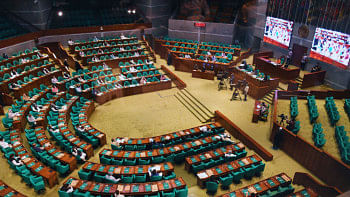The relation between corruption and remittance

Many Bangladeshis seek employment abroad due to limited job opportunities and economic conditions at home. The overseas employment sector has become a vital source of income for many families and contributes significantly to the national economy.
Workers employed overseas send money back home to support their families. This money, known as remittance, plays a crucial role in the Bangladeshi economy. It is a primary source of foreign currency and helps improve the living standards of many households. Remittances contribute to consumption, investment, and savings in the local economy. A high level of remittance inflow strengthens the forex reserves, which are essential for maintaining the stability of the national currency (taka), managing international trade, and ensuring the country can meet its foreign obligations.
"Corruption" on the other hand hurts the economy in more ways than one. In most cases, perpetrators resort to corrupt practises for their individual financial gains at the expense of the national economy. Therefore, it is important for the corrupt to secure the wealth accumulated through corruption. Gone are the days when black money was kept hidden inside mattresses—the enormity of modern-day scams involving thousands of crores of taka renders that option impractical today. Syphoning the money out of the country is the safest way now to protect the loot, and this is where "corruption" is linked to "remittance."
Those who want to send black money out of the country, need someone who will receive Bangladeshi taka inside the country, in return for foreign exchange handed over abroad. Bangladeshis working abroad are ideal partners for this transaction. These two parties, namely corrupt politicians, government officials, and businessmen on one side and migrant workers on the other, get connected by the "hundi" operators. Hundi is an informal method of transferring money, often used by migrant workers to send remittances back home as well as to transfer illegally accumulated wealth out of the country by the crooks. It is a faster and cheaper alternative to formal banking channels and operates outside the regulatory framework.
Hundi traders also offer services like collection and distribution of fund any time and at any location, short term credit, etc. The main reason migrant workers prefer hundi to official banking channels is because they get a better exchange rate than the official rate. That is why many recommend improving the official rate by bringing it close or equal to the unofficial (hundi) rate as a means to combat illegal transfer of money across the border.
However, "special exchange rates" and incentives to remittance earners have been introduced to no avail. Because, to the corrupt money launderer, the loss incurred due to difference in exchange rate is of little significance; protecting illegally amassed fortune and his/her goodwill are far more important. Therefore, no matter how much the exchange rate for the remittance earner is improved, hundi operators will offer an even better rate.
Many are sympathetic towards migrant workers for justifiable reasons. Migrant workers earn foreign currency staying separated from relatives/friends for lengthy periods, living in difficult conditions, combatting many adversities. Many may ask, "Is it a big deal, if they get a taka or two more for their hard-earned foreign currency opting for informal channels?" Some of them incorrectly think that the foreign exchange is entering Bangladesh, even if the informal channel (hundi) is used to remit the fund. People might also argue that it may not be going in the hands of the government if official banking channels are not used, but is added to local economy anyway. Maybe they do not realise that the US dollar or other foreign exchange earned by migrant workers do not enter Bangladesh at all, if sent through informal channels. Rather, it goes in the hands of corrupt individuals and groups who accumulate wealth illegally and remain abroad. The corrupt parties just hand over their accumulated wealth (taka) to relatives/friends of migrant workers living in Bangladesh, with the help of hundi operators. In effect, politicians and government officials resorting to bribery, businessmen defaulting on bank loans, importers avoiding duty by under-invoicing, smugglers dealing in restricted/banned substances get to enjoy a safe and convenient conduit to transfer their illegal wealth to a safe haven.
If hundi is the "vehicle" to transfer black money, "corruption" provides its fuel. While curbing corruption is a long-term process, following measures may prove to be effective in the short to medium term.
Creating awareness among all concerned, especially migrant workers, as to how hundi is not only depriving country of foreign currency earned abroad, but also encouraging corruption and providing a safe route to take illegal wealth out of the country.
A more effective measure could be to promulgate laws which will make it mandatory to bring in a certain percentage of migrant workers' income through official channel. The percentage amount should be determined by the Bureau of Manpower, Employment and Training (BMET) or any other competent authority after careful analysis of every worker's income, expenditure, savings and remittance pattern. Non-compliant workers may be held accountable when they return to Bangladesh. And in extreme cases, their NOCs may be cancelled and they may be barred from going abroad again for employment. Such measures may sound harsh, but one should remember that those who resort to hundi cause grave damage to the economy by facilitating corruption.
Mir Ashraful Hossain is the director and group COO of Urmi Group.
Views expressed in this article are the author's own.
Follow The Daily Star Opinion on Facebook for the latest opinions, commentaries and analyses by experts and professionals. To contribute your article or letter to The Daily Star Opinion, see our guidelines for submission.

 For all latest news, follow The Daily Star's Google News channel.
For all latest news, follow The Daily Star's Google News channel. 











Comments